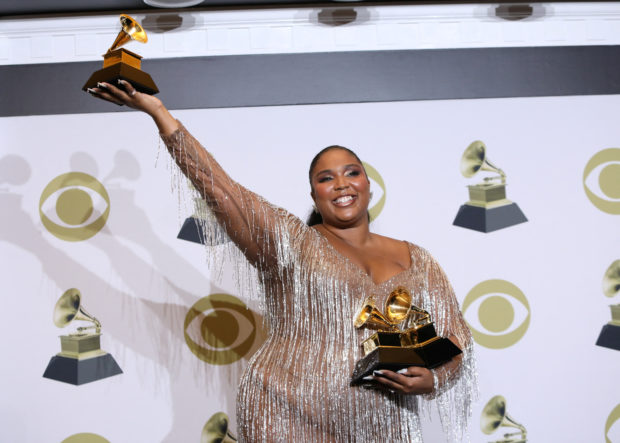
FILE PHOTO: Lizzo poses backstage with her Best Pop Solo Performance award at the 62nd Grammy Awards, Los Angeles, California, U.S., Jan. 26, 2020. REUTERS/Monica Almeida/File Photo
LOS ANGELES — Grammy-nominated breakup song “abcdefu” is the latest viral sensation to translate popularity on TikTok into chart-topping success and music industry acclaim.
The short-video app, with more than 1 billion monthly active users, has emerged as one of the music industry’s most powerful promotional platforms. Several of this year’s Grammy nominees, including “abcdefu” singer Gayle and R&B artist Muni Long, rose in popularity after influencers and everyday users posted TikTok videos with their music.
“TikTok is 90 percent of the game,” said Adamm Miguest, CEO and founder of Rapid Launch Media, which creates marketing campaigns designed to make songs go viral.
Even as the music industry gathers in Los Angeles to celebrate artists and their songs at Sunday’s Grammy awards, the relationship between hitmaker TikTok and music labels is showing signs of strain.
As deals with the major music companies expire, the labels are looking to receive some of TikTok’s ad revenue, according to Tatiana Cirisano, music industry analyst for Midia Research. EMarketer estimates TikTok will collect $14 billion from advertisers this year.
One industry executive argued that TikTok should be paying five times more than what it does now, based on payments from other platforms such as YouTube.
TikTok limits music clips to one minute and does not allow the full-length songs available on other streaming apps.
Against this backdrop of licensing talks, TikTok this week began preventing certain users in Australia from using some music in their videos. One music industry insider, who spoke on condition of anonymity, said “it’s open to interpretation” why this is happening now. Another called it a negotiating tactic.
TikTok said the move was a limited test, one of many it regularly runs to gather information about users’ behavior and improve their experience.
“This change will not be in place for long and not all music is affected,” a TikTok spokesperson said. “We look forward to restoring our full catalog soon.”
TikTok declined to comment on any discussions with music labels.
Because the service is especially popular with young consumers who serve as music’s tastemakers, TikTok is an important platform for the industry. That’s why even established groups, such as the Rolling Stones, can be found on the app.
Half of consumers ages 16 to 24 use TikTok weekly and another 40% check it every day, according to the latest data from Midia. The app ranks second only to Alphabet’s YouTube as the place Gen Z goes to find new music, Midia found.
“TikTok has become really integral to the way that younger people relate to music, discover music and consume it,” Cirisano said.
Miguest, who has worked on behalf of Long, Curtis Waters and a collaboration between Lizzo and Cardi B, said TikTok works for musicians because users take part in the promotion.
After seeing a creator’s dance video, “they go to replicate it just for fun,” Miguest said. “They become part of the machine that’s moving that song.”
The ability to create videos on TikTok helps forge a connection with fans, said Ole Obermann, global head of music at TikTok, just as “people used to obsess about mixed tapes back in the day, or the perfect playlist.”
“Now, people will spend hours making the perfect video with the perfect song” on TikTok, he said.
Songs such as Olivia Rodrigo’s 2021 hit “drivers license” and 2019’s “Old Town Road” from Lil Nas X were among the first Grammy nominees to build buzz on TikTok.
On this year’s list, best new artist nominee Omar Apollo saw his song “Evergreen” trend on TikTok as did R&B artist Steve Lacy with “Bad Habit,” which helped him land four nominations.
For Gayle, the momentum “abcdefu” received on the app carried over to Spotify, which logged nearly 903.6 million streams of the song.
“I think everyone’s hope is that their song or new single will go viral on TikTok,” said Stephanie Smith, head of IQ Talent Strategy, the data, research and digital strategy division at United Talent Agency.
While TikTok can help a little-known artist break out, even major stars like Lizzo benefit. Her Grammy-nominated song, “About Damn Time,” was used in more than 4.1 million user-created videos, according to TikTok.
When an established artist debuts new music, “the fans will find that, but TikTok definitely amplifies that,” said Obermann. “We just help the audience connect with the song or album faster, or bigger.”
Some artists, however, have complained about pressure to create their own TikTok videos to promote their music.
“I’ve been in this industry for eight years and I’ve sold over 165 million records and my record company is saying I can’t release (a new song) unless they can fake a viral moment on TikTok,” Halsey said last year – in a video posted on TikTok.
Plus, some politicians in Washington want to ban TikTok in the United States because they worry about the role of its Chinese owner, ByteDance. The company has said the personal data of U.S. citizens is protected and that China’s Communist Party cannot manipulate content on TikTok.
Miguest said the music industry will adapt if the United States blocks TikTok.

